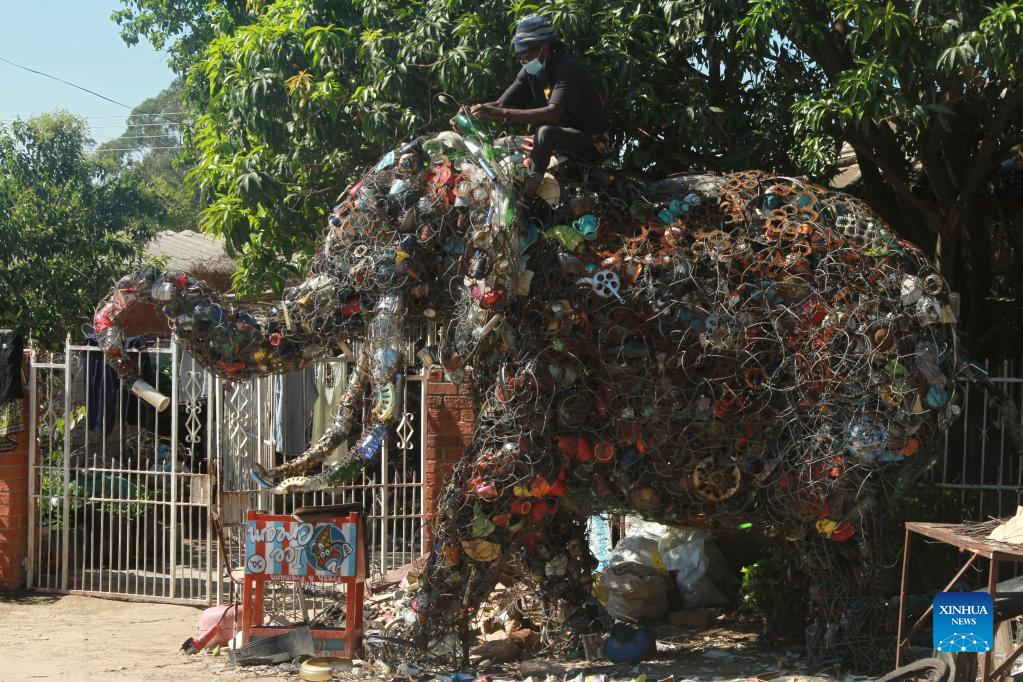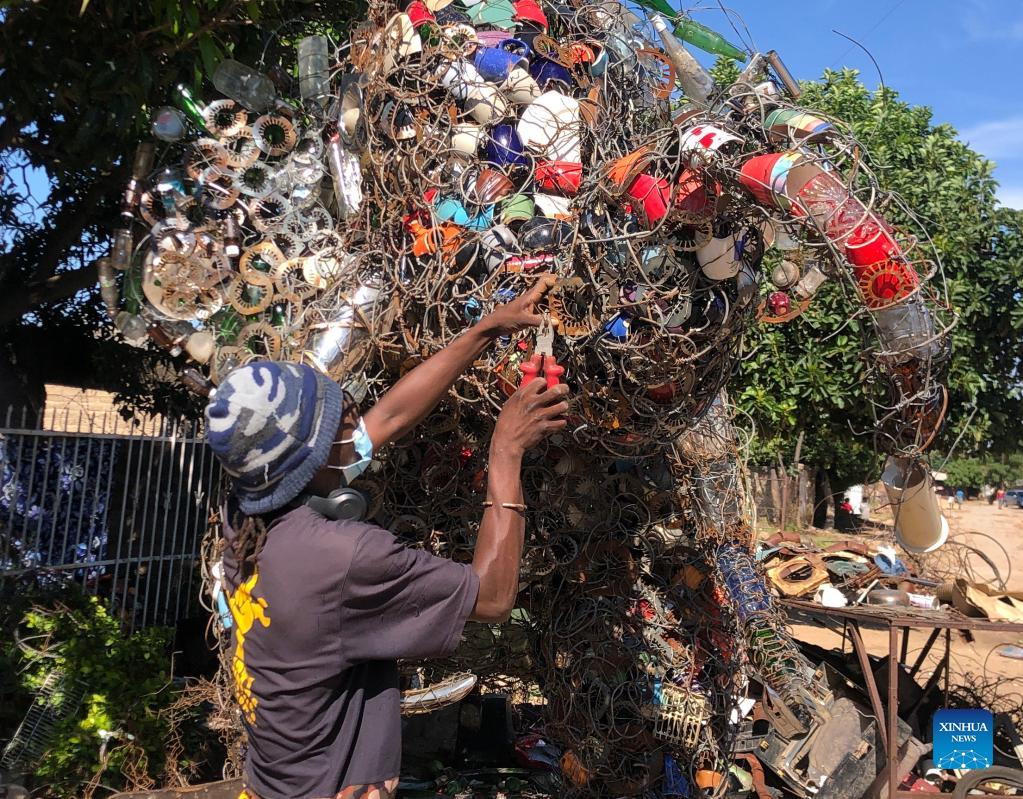
Johnson Zuze, a mixed media artist, works on his latest piece of art made from recycled materials in Chitungwiza, Zimbabwe, on Dec. 29, 2021. (Xinhua/Tafara Mugwara)
by Tafara Mugwara
CHITUNGWIZA, Zimbabwe, Jan. 11 (Xinhua) -- One man's trash is another man's treasure! The saying literally describes the works of Johnson Zuze, a 36-year-old Zimbabwean mixed media artist who makes artistic statements out of trash.
Armed with nothing but his hands and the junk he collects from dumpsites in his hometown of Chitungwiza, about 30 km south of Harare, the capital of Zimbabwe, Zuze is fighting hard for raising awareness about the protection of the environment -- not by words but through visual artistic expressions.
"What I do is I collect items of urban junk either from street corners or landfills and I give them new existence beyond their primary use into a poetic justice dimension," Zuze told Xinhua.
His latest piece titled "Save and Protect," is an art installation resembling a full-size elephant completely made out of recycled materials.
The self-taught artist said the idea behind the piece, which is a commissioned artwork for a regular client in the United States, is to give new existence to daily objects and present them with a lively presence beyond their primary use.
The symbolic figure, which is made partly of snare wire used by poachers and other recycled materials such as glass and ceramic items, speaks of two pressing issues -- recycling and the protection of wildlife.
The whole structure, which took him more than five months to complete, was erected without any welding but with hand fastened wires only. The only tool involved was an angle grinding machine.
To make the piece structurally sound, the core skeleton was made using spring wire, a type of wire that resists corrosion, but is not friendly to work with because of its spring nature and resistance to tension. The other wires that make up the structure are fences from the pre-colonial era which people are now replacing with precast concrete walls, thereby presenting a challenge to waste management authorities.
The rest of the objects are non-biodegradable items such as bottles and ceramic items, which give the work resistance to harsh weather conditions.
Zuze said it's high time people adopted sustainable ways of managing waste, adding that if not managed properly, non-biodegradable waste will present challenges to future generations.
"A bottle needs something like a million years to decompose. So those are the materials that I usually target. Those that take long to decompose," Zuze said.
In addition to being widely available, bottles and ceramic items maintain color and texture without fading over time, he said.
The talented artist said the use of snare wire is a statement against poaching, which is a major issue in Zimbabwe.
Zimbabwe houses the second largest herd of elephants in the world, and poachers continue to endanger the lives of the giant land mammals.
Inspired by his parents, Zuze had his early works mainly made of wire despite no formal training in creative art.
Growing up in the high-density township of Chitungwiza, Zuze said his father used to make craft art, kitchen and hardware products using wire, and his mother used to print fabrics.
The artist said his interest in recycling was sparked after the burning down of his family house in 2009 and he went through the remains to express himself.
From the remains of the burnt house, he collected metal items such as spoons and wire and created a work called "Beautiful Struggle." He said the work was meant to portray the image that hope can still be found even in unimaginable situations.
The artwork established him as one of the pioneers of his genre of art in Zimbabwe, kick-starting his career as a mixed media artist. It also earned him an award at Harare-based Gallery Delta on an exhibition event titled "Unity exhibition."
Since then, the artist has managed to attain 11 awards on different occasions, including the National Arts Merit Award (NAMA) in 2016.
Known as one of the pioneers of found object art in Zimbabwe, Zuze has groomed many artists of the same genre who used his template to create their own identities.
He said art in itself is a powerful means of self-expression, as it communicates messages that cannot always be described in words but are felt and shared among communities.
While many artists are struggling with pandemic-related disruptions to the art industry, Zuze took advantage of the increased use of the internet during the pandemic to market his works.
"During the start of the pandemic, I started to receive more commissioned works, maybe because I was using the internet more than before," he said.
His work has gained worldwide acclaim, and later this year he will hold a solo exhibition in the United Kingdom. The works for the show are currently under construction and will be reviewed by the public in the coming months. ■

Johnson Zuze, a mixed media artist, works on his latest piece of art made from recycled materials in Chitungwiza, Zimbabwe, on Dec. 29, 2021. (Xinhua/Tafara Mugwara)
